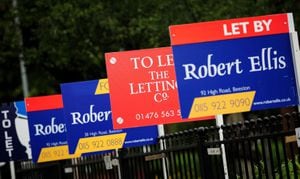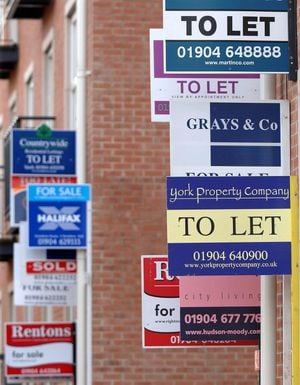Fears flood of homeless tenants on the way as landlords flee rental sector
Robin Lloyd reckons he got off lightly.

When his new tenant refused to pay rent, he was £12,000 out of pocket by the time he managed to evict him.
“The average amount amongst other landlords I spoke to was £33,000,” he says, adding the experience with his other rental property, in Shropshire, was even worse.
“I had drugs being sold to kids in my garden by someone who killed one of them with his sword,” he says. “The judge said he was convinced he had acted in self defence. Curtains were set on fire by the said drug seller, and furniture slashed. Okay, he was a guest of the tenant but you do not need it do you?”
It seems Mr Lloyd is not alone in questioning whether being a landlord is really worth the trouble. According to the Hamptons International letting index, the number of landlords in the private rental sector has fallen to a seven-year low with 2.66 million operators last year – down 222,570 from 2017.
Steve Rowe, of Goodchilds letting agents in the West Midlands, is not surprised.
He said: “Whenever a tenant gives notice to vacate a property now, the first question the landlord asks is ‘how much is it worth?’ They just want to get out.”
A recent survey by the National Rental Landlords Association found 29 per cent of landlords expected to experience some sort of financial hardship as a result of the coronavirus pandemic.

Mr Lloyd, who has two properties – one in London, and his other in Shropshire – thinks there will be plenty more to follow, and blames ever-tightening government legislation for property owners deserting the market.
“I am wondering if there will be any landlords left soon,” he says. “A lot of people think that will be a good thing. But if you are a tenant it’s not. Nowhere to go, because there will be no property for you.”
Mr Lloyd says despite the perception by some of landlords exploiting their tenants, the reality is that excessive regulation is making many question whether it is worth the bother. And while the Government clearly believes the extra rules are necessary to protect tenants, Mr Lloyd says it will simply result in the taxpayer having to pick up the bill for hotel accommodation.
“I used to get three or four applications for my property, now it’s 20 or 30,” he adds. “Soon it will be even more and most are decent people. It is heartbreaking to just not be able to find a place for all of them.”
Mr Lloyd expects to see a flood of evictions and property sales once the Covid-19 restrictions come to an end.
“There will not be a private rental sector,” he says. “As soon as the brakes come off banning evictions there will be a flood of them and property sales. The taxpayer will have to fork out for the £200-per-night London hotel or similar for the homeless.”
Mr Lloyd tells how one of his ex-tenants had begged to rent his flat from him, after he was found sleeping on a pallet in the basement of a café with his pregnant wife.
“The sensible thing to do was walk away. No references, a recent immigrant, benefits, part-time work as a labourer,” he says, but he took pity on the man. “As soon as he was in there he said, ‘this is my home now, I live here’ and refused to pay rent.”

Mr Lloyd adds that the man continued to claim housing benefit while living rent-free, and even complained about the lack of a view from the window.
“Property no longer makes a profit for me,” he says. “I hang on for my pension to kick in. If not for that I would be ‘financially embarrassed’ as they say in polite society.”
Bernie Lewis, chairman of Wrekin Landlords Association, says the group has lost 18 members over the past three years because they had decided being a landlord was no longer worthwhile.
“When people used to ask me where to invest their money, I always used to say that property was the best investment you can make, but I wouldn’t recommend it today,” he says. “We’re all very concerned. It’s nowhere near as attractive as it was 20 years ago, and it’s getting worse.”
Mr Lewis said it was particularly difficult for smaller landlords, who didn’t have any financial cushion if their tenants stopped paying rent.
Another problem is ‘accidental’ landlords, who maybe through bereavement or a change in family circumstances, find themselves with an empty property they are unable to sell. Mr Lewis says they very quickly find they are ill prepared for the work required.
“They think ‘I’ll rent that out’, but they have no idea of what you have to do,” he said of the work involved.
Agents point to lack of properties as laws always tighten

Steve Rowe, director of Goodchilds, reckons there has been a 10 per cent drop in the number of rental properties on this books over the past year.
“It’s the taxation mainly,” he says. “It’s just starting to hit the landlords.
“The legislation doesn’t help. I can understand why they’re doing it, properties need to be safe, but it’s causing a shortage. Whenever a tenant gives notice to vacate a property now, the first question the landlord asks is ‘how much is it worth?’ They just want to get out.”
Mr Rowe, who works in Walsall, says there is no doubt this is creating a shortage of rental properties, and drives rents up: “I don’t understand the Government’s thinking. There’s a housing shortage, but they don’t want to provide support for the private rented sector.”
Dawn Clarke, lettings director at Nock Deighton estate agents, says there is a growing shortage of rental properties – with those that do come onto the market being snapped up almost instantly.
“We’re finding, especially this year, that demand is far exceeding the number of properties we have coming in,” she says.
“As soon as we put a property onto our website, we are inundated with inquiries. Properties are flying out the door.”
Mrs Clarke says the number of inquiries to the firm, based in Bridgnorth, Ironbridge and Telford, in recent months has increased by something like 25 per cent, in part due to pent-up demand following the coronavirus lockdown.
But at the same time, the number of landlords is dwindling.
Difficult
“I would say over the last two years, we have probably had about 10 per of landlords who have decided to sell up,” she says.
Mrs Clarke says the growing number of rules that landlords must comply with is a major factor in this. “All the governments introduce new legislation, but it’s making it more and more difficult for landlords to invest in property,” she says.
“There have been 15 new pieces of legislation introduced in the last five years.
“The problem is we have such a huge demand for rental properties. In this area it’s going to be a problem.
“The Government needs to look at providing some kind of support for landlords as well.”
Harvey Samra, of Wolverhampton-based Harveys Estates, says being a landlord is less attractive than it was a few years ago.
“There’s always plenty of tenants, and far fewer landlords,” says Mr Samra of the situation.
He says the cut to tax relief has probably been the biggest disincentive to invest in property in recent years.





